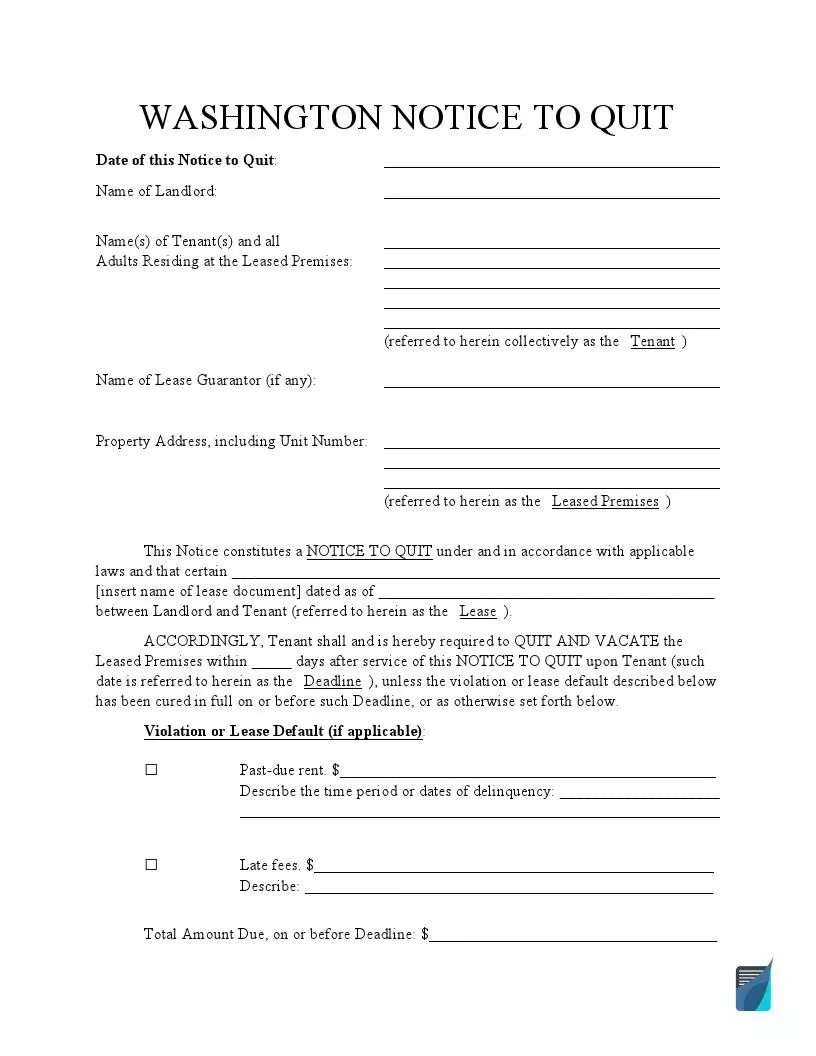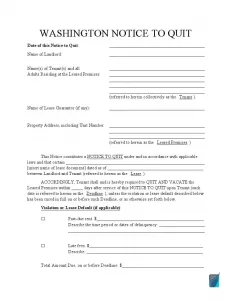Washington Eviction Notice Forms
Millions of eviction cases occur in the United States every year. Eviction returns the possession of the property to the landlord by expelling the tenant from the property. Landlords can do it alone or with the help of local law enforcement.
Any landlord can use Washington eviction notice templates to create a notice needed before proceeding with appealing to court. Use our latest software to generate a needed one. Sometimes creating an eviction notice template allows the parties to attempt resolving the issue themselves.
The eviction process usually follows roughly three stages:
- Notice
- Court action
- Eviction
Most evictions do not require the presence of an attorney and get solved without attorneys involved. There are, of course, a few cases when this is needed, for example, if the tenant has been accused of conducting illegal activities on the property.

Build Your Document
Answer a few simple questions to make your document in minutes
Save and Print
Save progress and finish on any device, download and print anytime
Sign and Use
Your valid, lawyer-approved document is ready
Washington Eviction Laws
The law in Washington is strict and very clear when it comes to eviction regulations and rules. Most decisions would be guided by the Residential Landlord-Tenant Act. Under the Act, landlords have to write notices in plain language.
The notices must also include information on legal resources available to the tenant. The landlord should try to deliver the notice in person to the tenant or an adult who is living with them. If the landlord fails to deliver the notice in this way, they have to stick the notice on the front door and also mail it.
The laws define the most commons causes of eviction:
- Non-payment of rent
This is a very straightforward and common issue arising during multiple tenancies a year in the state. If the tenant withholds the rent, the landlord can act on it by first submitting an appropriate notice of 14 days for the tenant to sort it or quit.
- Breach of the lease
The breach of the agreement can cover various situations. There are several most typical scenarios, though. Lease agreements usually state how many people can live in the property at the same time. If the tenant has somebody else living in the apartment, they are breaching the lease. If they have a pet in the apartment, and the lease has a clause that does not allow the tenant to have pets, they are also breaching the lease.
- Refusing to vacate after the termination of the rental agreement
Sometimes the tenant does not move out at the time when they should go according to the terms and conditions of the agreement. This can result in an eviction enforced by the court order.
The eviction process always starts with a termination notice. Verbal communication never counts as notice. That is why the landlord has to use eviction notice templates to create a written notice. The notices are warnings. The tenant may accept the demands of the landlord to stop breaching the rules. If they do so, the eviction does not go to court.
Washington Eviction Notice Laws Details
| Rent Grace Period | Not specified |
| Notice of Non-Payment | 14 days |
| Notice of Non-Compliance | 10 days |
| State Laws | Washington Revised Code, Chapter 59.12 |
Eviction Notice Types Used in Washington
A Notice to Pay or Vacate (for Non-Payment of Rent)
Washington has changed the regulations about the notice to vacate for non-payment of rent. Currently, the landlord has to give the tenant the “Pay or Vacate” notice of 14 days for such a violation. The tenant may pay the rent within 14 days and not get evicted from the property.
A Notice to Comply or Vacate (for Non-Compliance with the Lease)
If the tenant breaks the rules of their agreement, the landlord will give them the notice to comply or vacate. These notices are given for 10 days in the state of Washington.
A Notice of Lease Termination (for a Month-to-Month Lease)
When the tenant and the landlord have a month-to-month agreement in Washington, if the landlord wants to terminate the agreement, they do not need to state a reason for that. They have to give the tenant 20 days in Washington. But some cities, including Seattle, require that it should be 60 days.
A 3-Day Notice to Quit
This type of notice is given when the tenant is involved in illegal activities or destroys the property.

Popular Local Eviction Notice Forms
- MO eviction notice guidelines
- Free North Carolina notice to vacate template and guide
- Sample Virginia (VA) notice to vacate and laws
- Fillable MA notice to vacate and guide
- Free TN notice to quit form PDF
- Legal Illinois (IL) eviction notice form and guide
- Texas (TX) eviction notice example
- Maryland (MD) notice to vacate example
Eviction Process in Washington
- Deliver the Notice
Some problems may be solved at this stage if the tenant agrees to comply with the demands of the landlord to keep paying rent, for example.
- Go to Court to Start the Unlawful Detainer Action
If the issue has not been resolved by giving the written notice, the landlord starts the legal action in court.
- Wait for the Response to the Legal Forms Sent to the Tenant
The tenant will have to respond in writing when they receive the summons and the complaint. They have seven days to do it.
- Attend the Court Hearing
Both parties should appear in court for the hearing.
- Wait for the Writ of Restitution to be Served
When the court makes the judgment in favor of the landlord, the tenant will receive a writ of restitution to notify them when they have to move out.
Eviction Court Forms
- Eviction Summons
The tenant receives the summons after the court process has started. This form contains the date when they have to appear in court.
- Eviction Complaint
The tenant receives the complaint together with the summons. The tenant has to respond to both forms in writing.
- Writ of Restitution
The process typically ends when the judge authorizes a writ of restitution. This legal document allows the sheriff to enforce the decision of the court if the tenant does not follow it. The sheriff typically sticks the writ of restitution on the door, also leaving their contact details. The sheriff can enforce the order of the court 72 hours after they have served it.

Need other Washington documents? We offer free forms and straightforward customization experience to anybody who wishes for having fewer to none complications when facing paperwork.
